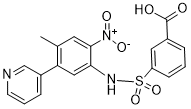All AbMole products are for research use only, cannot be used for human consumption.

Alofanib (RPT835) is a novel selective allosteric inhibitor of FGFR2 and has a dramatic inhibitory effect with IC50 <10 nM on FGF2-induced phoshphorylation of FRS2a in KATO III cells. Alofanib induces mainly apoptosis with cleavage of caspase 3, PARP and Bcl-2 in SKOV3 cell line. Cytotoxic effect of compound on ovarian cancer cells is low. Alofanib inhibits phosphorylation of FRS2α with the IC50 values of 7 and 9 nmol/l in cancer cells expressing different FGFR2 isoforms. In a panel of four cell lines representing several tumour types (triple-negative breast cancer,melanoma, and ovarian cancer), alofanib inhibits FGF-mediated proliferation with 50% growth inhibition (GI50) values of 16-370 nmol/l. Alofanib dose dependently inhibits the proliferation and migration of human and mouse endothelial cells (GI50: 11-58 nmol/l) compared with brivanib and bevacizumab.
In vivo, Intravenous alofanib significantly in dose-dependent manner potentiated the efficiency of the combination of paclitaxel and carboplatin. Alofanib suppresses angiogenesis in ovarian cancer mouse model. In a FGFR-driven human tumour xenograft model, oral administration of alofanib is well tolerated and results in potent antitumour activity.
| Cell Experiment | |
|---|---|
| Cell lines | SKOV3, HS478T, Mel Kor cells |
| Preparation method | Inhibited growth of SKOV3 and HS578T cells with GI50s of 0.37 and 0.21 μM. Did not potently inhibit growth of Mel Kor cells that do not contain FGFR2 (GI50>10 μM). |
| Concentrations | 0.2, 0.4, 0.8 μM |
| Incubation time | 6 hours after dosing, FGF2 is added at a concentration of 25 ng/ml |
| Animal Experiment | |
|---|---|
| Animal models | C57Bl/6 × DBA/2 F1 mice of 22-30 g |
| Formulation | vehicle (water) |
| Dosages | 10 mg/kg/d |
| Administration | Intraperitoneally, 0, 3 and 6 d |
| Molecular Weight | 413.40 |
| Formula | C19H15N3O6S |
| CAS Number | 1612888-66-0 |
| Solubility (25°C) | DMSO ≥ 30 mg/mL |
| Storage |
Powder -20°C 3 years ; 4°C 2 years In solvent -80°C 6 months ; -20°C 1 month |
| Related FGFR Products |
|---|
| SNIPER(TACC3)-11
SNIPER(TACC3)-11 is a potent FGFR3-TACC3 degrader. |
| LY-3076226
LY-3076226 is an antibody drug coupling (ADC) with a cleavable linker targeting FGFR2. |
| Aprutumab ixadotin
Aprutumab ixadotin is an antibody drug coupling (ADC) with a non-cleavable linker that targets FGFR2. |
| Gunagratinib
Gunagratinib is an orally active, potent, selective, and irreversible fibroblast growth factor receptor (pan-FGFR) inhibitor for use in cancer research. |
| SAR-442501
SAR-442501 is a novel anti-FGFR3 monoclonal antibody for studies related to achondroplasia (ACH). |
All AbMole products are for research use only, cannot be used for human consumption or veterinary use. We do not provide products or services to individuals. Please comply with the intended use and do not use AbMole products for any other purpose.


Products are for research use only. Not for human use. We do not sell to patients.
© Copyright 2010-2024 AbMole BioScience. All Rights Reserved.
